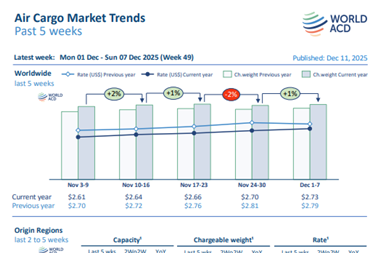The air cargo industry will not suffer any “lasting negative impact” from the pandemic, an industry expert has said.
Speaking at the Scan Global Logistics Air & Ocean Freight Outlook June 2022, Ashwin Bhat, chief commercial officer at Lufthansa Cargo, said that the company believes: “There won’t be any lasting negative impact from the pandemic for air cargo.”
He said there are five reasons why. The first is that global economies will recover, the second is that air cargo continues to transport high value goods, the third is that the air cargo industry continues to solve problems, the fourth is that global trade will continue and the fifth is that there are increasing customer demands for speed. These will ensure the industry remains relevant.
Bhat said the future focus of air cargo should be on ensuring the supply chain is a “value chain”, alongside more fluid collaboration, and more smart solutions, including those that cut CO2.
In the present, he said that peaks of uncertainty are increasing.
“One crisis after another on top of each other is coming and that is the world we are living in. As air cargo we have lived through it in the last few years.”
At Lufthansa Cargo, belly capacity at the end of last year was down 27%. Capacity is currently still down down 8-10%.
The Ukraine-Russia war affected competition and capacity because of the closure of airspace, meaning Lufthansa, alongside other airlines, was forced to fly a longer Europe-Asia route than normal.
The Shanghai and Beijing Covid lockdowns also further affected capacity due to the lack of ground facilities in China.
Bhat said passenger demand is steeper than expected but the capacity gap remains: "The air cargo capacity projection is that we will come to the pre-Covid situation only by 2025.”
But the demand for commodities and products is climbing. The supply chain disruption has been exacerbated by a lack of spare parts and materials following factory shutdowns in China during the lockdowns, putting more demand pressure on airfreight to deliver when these become available.
Port congestion continues to be an advantage for the air cargo industry. Fewer ships are waiting at ports, but huge delays remain, said Bhat.
The rise of e-commerce also continues to push up demand for airfreight capacity.
On the subject of whether there has been a softening of rates, Bhat said: “We see some softness in the market party because of the Shanghai lockdown, Ukraine war and inflation.” However, he added there is also “seasonal” softening.
Anticipated changes to the market include Asia to Europe trade because of the end of the Shanghai Covid lockdown, and the North Atlantic trade due to more belly capacity creating overall excess capacity.
Lars Jensen, chief executive and partner of Vespucci Maritime summarised that within the maritime sector “demand is ok, but capacity is lacking”.
He said: “The market is normal in most trades. Up until now there hasn’t been signs of weakness in the market.”
Jensen stressed that demand is not weak but imbalances are worsening, meaning more empty containers need to moved. When imbalances increase, empty containers increase and so demand increases.
However he said: “When vessels are delayed outside a port this is effectively taking remaining capacity out of the market.”
Improvements in capacity absorption have been marginally improved, he added.















